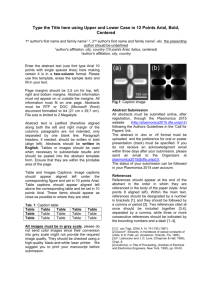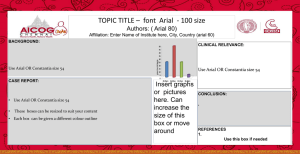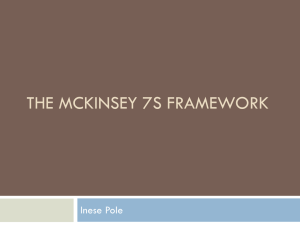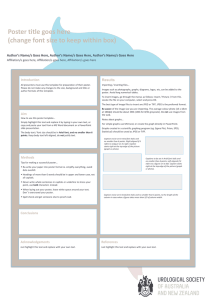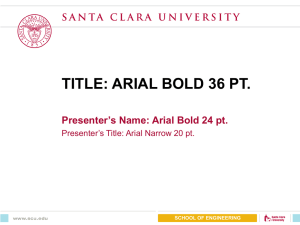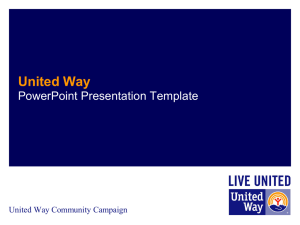Poster Title - Eastern Health
advertisement
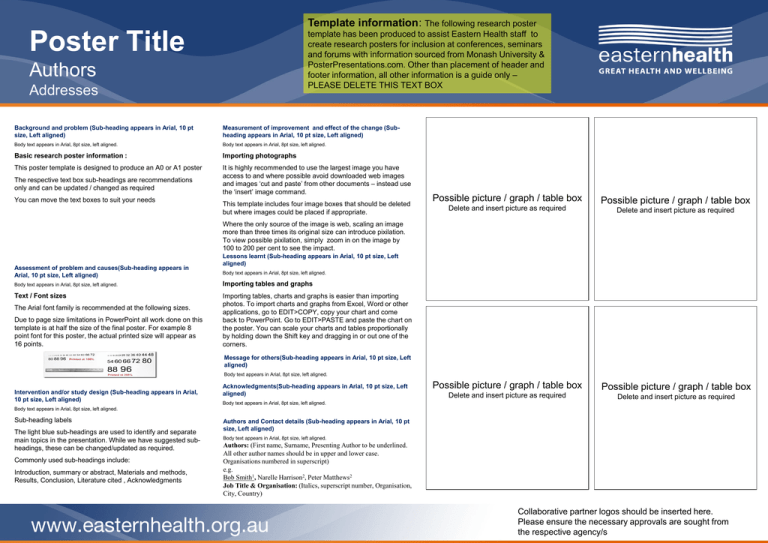
Template information: The following research poster Poster Title template has been produced to assist Eastern Health staff to create research posters for inclusion at conferences, seminars and forums with information sourced from Monash University & PosterPresentations.com. Other than placement of header and footer information, all other information is a guide only – PLEASE DELETE THIS TEXT BOX Authors Addresses Background and problem (Sub-heading appears in Arial, 10 pt size, Left aligned) Measurement of improvement and effect of the change (Subheading appears in Arial, 10 pt size, Left aligned) Body text appears in Arial, 8pt size, left aligned. Body text appears in Arial, 8pt size, left aligned. Basic research poster information : Importing photographs This poster template is designed to produce an A0 or A1 poster It is highly recommended to use the largest image you have access to and where possible avoid downloaded web images and images ‘cut and paste’ from other documents – instead use the ‘insert’ image command. The respective text box sub-headings are recommendations only and can be updated / changed as required You can move the text boxes to suit your needs This template includes four image boxes that should be deleted but where images could be placed if appropriate. Possible picture / graph / table box Delete and insert picture as required Possible picture / graph / table box Delete and insert picture as required Where the only source of the image is web, scaling an image more than three times its original size can introduce pixilation. To view possible pixilation, simply zoom in on the image by 100 to 200 per cent to see the impact. Assessment of problem and causes(Sub-heading appears in Arial, 10 pt size, Left aligned) Lessons learnt (Sub-heading appears in Arial, 10 pt size, Left aligned) Body text appears in Arial, 8pt size, left aligned. Body text appears in Arial, 8pt size, left aligned. Importing tables and graphs Text / Font sizes Importing tables, charts and graphs is easier than importing photos. To import charts and graphs from Excel, Word or other applications, go to EDIT>COPY, copy your chart and come back to PowerPoint. Go to EDIT>PASTE and paste the chart on the poster. You can scale your charts and tables proportionally by holding down the Shift key and dragging in or out one of the corners. The Arial font family is recommended at the following sizes. Due to page size limitations in PowerPoint all work done on this template is at half the size of the final poster. For example 8 point font for this poster, the actual printed size will appear as 16 points. Message for others(Sub-heading appears in Arial, 10 pt size, Left aligned) Body text appears in Arial, 8pt size, left aligned. Intervention and/or study design (Sub-heading appears in Arial, 10 pt size, Left aligned) Acknowledgments(Sub-heading appears in Arial, 10 pt size, Left aligned) Possible picture / graph / table box Possible picture / graph / table box Delete and insert picture as required Delete and insert picture as required Body text appears in Arial, 8pt size, left aligned. Body text appears in Arial, 8pt size, left aligned. Sub-heading labels The light blue sub-headings are used to identify and separate main topics in the presentation. While we have suggested subheadings, these can be changed/updated as required. Commonly used sub-headings include: Introduction, summary or abstract, Materials and methods, Results, Conclusion, Literature cited , Acknowledgments Authors and Contact details (Sub-heading appears in Arial, 10 pt size, Left aligned) Body text appears in Arial, 8pt size, left aligned. Authors: (First name, Surname, Presenting Author to be underlined. All other author names should be in upper and lower case. Organisations numbered in superscript) e.g. Bob Smith1, Narelle Harrison2, Peter Matthews2 Job Title & Organisation: (Italics, superscript number, Organisation, City, Country) Collaborative partner logos should be inserted here. Please ensure the necessary approvals are sought from the respective agency/s
